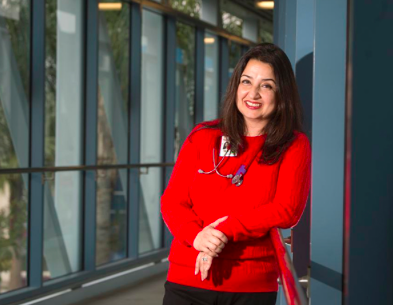Other Categories
By Angela Kelly
Associate and Advocate at Peggy Lillis Foundation
Angela Kelly, creator of the website Gutsy Mother and Clostridium difficile (C. diff) survivor, recently interviewed Dr. Negar Ashouri, a pediatric infectious disease specialist at Children’s Hospital of Orange County (CHOC) in Orange, California, one of the top children’s hospitals in the United States. Dr. Ashouri treated Angela’s daughter, Arden, who is also a C. diff survivor.

Q: What led you to become a pediatric infectious disease doctor?
A: I have always loved working with kids, so the pediatric part was easy. I initially was not set on being an infectious disease specialist, but during my training I had some incredible mentors who were ID physicians and got me excited about medicine in general but ID specifically. I realized that a large part of being an ID physician was trying to solve puzzles, which was something I have always loved doing. You are given a case, and it’s your job to gather the clues and organize everything in a way that makes sense. Once you do that, then everything else falls into place, and you can find the treatment and make your patient better. For me, there is no better satisfaction than seeing the relief in parents’ eyes when their child is feeling better.
Q: Is pediatric C. diff on the rise, and why is C. diff so difficult to treat?
A: C diff is definitely on the rise. Part of it is due to the increased awareness of the problem as well as more sensitive testing methods, but a large part is due to the increased use of antibiotics. Antibiotics, when used properly, are important for killing harmful bacteria that are causing an infection. But in the process, they also kill the good bacteria we all have in our gut. When the balance of good bacteria is disrupted, opportunistic bacteria such as C. diff can multiply and cause problems. Most of the people who suffer from severe C. diff are those with weakened immune systems or chronic medical problems, but sometimes that disruption of the gut microbiome is enough to cause problems in otherwise healthy individuals as well. In addition, the C. diff spores are very sturdy and can survive in the environment for a very long time, so people can be infected or reinfected via fecal oral contamination of food, utensils, etc.
Q: Antibiotic resistance is a growing global threat; what can parents do to help protect their families? (such as antibiotic stewardship and hand washing)
A: By far, the most important thing is good hand washing. The majority of germs are transmitted from person to person or contaminated surfaces by dirty hands. Washing your hands with soap and water is the most effective means of stopping the spread of germs. Getting kids vaccinated is another important means to help protect families. Vaccinations protect kids from many of the germs that caused severe diseases in the past and required antibiotic therapy, such as H flu, Streptococcus pneumoniae and Pertussis. If they are protected from these infections, the number of antibiotics they will need is significantly reduced as well.
Q: The IDSA/SHEA* recently updated C. diff treatment guidelines, calling for vancomycin and fidaxomicin rather than metronidazole as first-line treatments for C. diff. Will this change to the treatment recommendations also affect the first-line treatment of pediatric patients?
A: The first-line treatment in adults has changed to vancomycin or fidaxomicin. In pediatrics, the first-line treatment for mild disease still includes either metronidazole or oral vancomycin. For recurrent disease or severe disease, oral vancomycin is the drug of choice. Fidaxomicin has not yet been approved by the FDA for the pediatric population.
Q: Are pediatric clinical studies of fidaxomicin still ongoing at CHOC? When will it be available to pediatric patients not participating in clinical studies?
A: We are wrapping up our participation in the pediatric clinical trial for fidaxomicin. We are hoping that the data provided by the CHOC patients in addition to all the other study sites will lead to approval for its use in the pediatric population soon.
Q: What new advances in infectious disease medicine are you most excited about?
A: There are so many new and exciting advances every day in medicine. For me, one of the exciting advances is the ability to use molecular testing to identify pathogens. What used to take us days to identify can now be identified in hours, allowing us to target our therapies more rapidly and cut down unnecessary antibiotic use.
Q: As the mother of a young child and an extremely busy infectious disease doctor, how do you make your jam-packed schedule work and what tips do you have for other busy moms?
A: I think as moms we all do the best we can to juggle home, children and other responsibilities. When things go well, we feel like we are on top of the world, and when things don’t, we blame ourselves for not being good enough. I think we just need to take one day at a time and realize that when we do things out of love, it will always be good enough!
For more about Angela and her family’s struggle with C. diff, visit gutsymother.com and click here to read her C. diff story.
*IDSA is the Infectious Diseases Society of America, and SHEA is The Society for Healthcare Epidemiology of America.




Leave a Reply